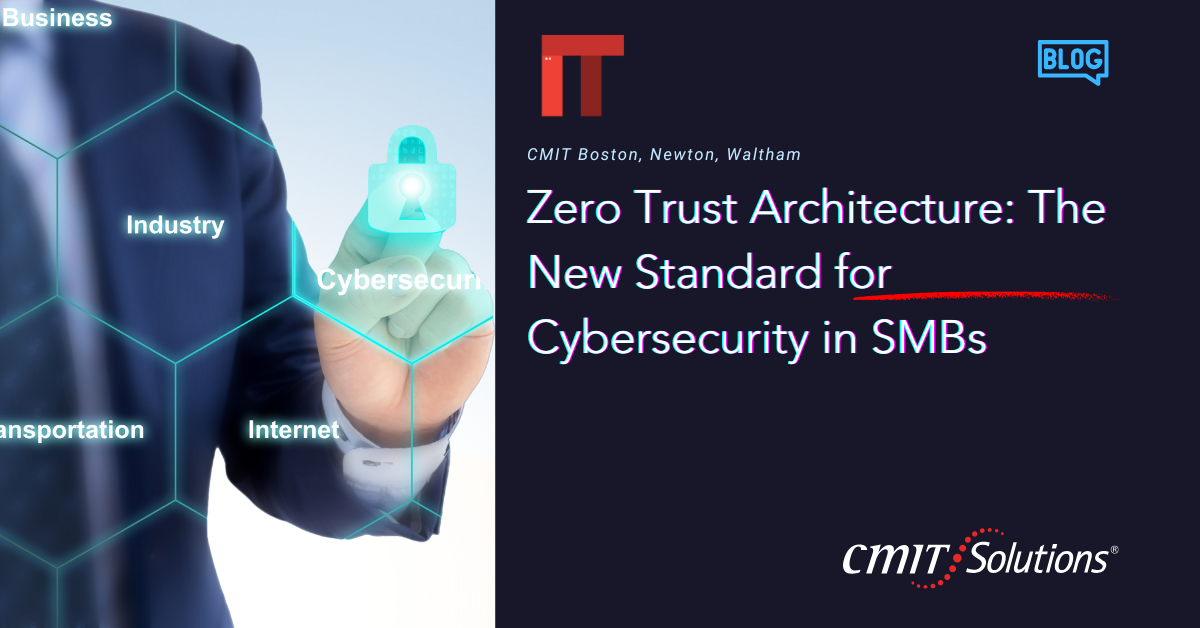Introduction: Why SMBs Can’t Afford to Trust the Traditional Perimeter
In the age of hybrid workforces, cloud computing, and rampant phishing attacks, traditional perimeter-based security models are no longer sufficient for SMBs. Enter Zero Trust Architecture (ZTA)—a security framework built on the principle of “never trust, always verify.” For small and mid-sized businesses navigating modern digital challenges, this model is rapidly becoming the gold standard.
As industries in Boston—from finance to education to healthcare—continue evolving, the need for robust cybersecurity has never been more pressing. CMIT Boston, Newton & Waltham is helping local businesses transition to Zero Trust to mitigate risk, streamline compliance, and protect sensitive data across complex IT environments.
What Is Zero Trust Architecture?
Zero Trust is not a product but a strategic approach to security. It assumes every request—inside or outside the network—is potentially hostile. Instead of automatically trusting users or devices based on their location (e.g., being inside the corporate firewall), ZTA enforces continuous validation.
Key components include:
- Identity verification and strong authentication
- Least privilege access controls
- Micro-segmentation of networks
- Device posture checks
- Real-time monitoring and response
In the context of SMBs, Zero Trust aligns perfectly with modern IT needs—especially as companies increasingly rely on cloud platforms and remote collaboration tools like Microsoft Teams. CMIT’s comprehensive guide to Teams migration supports this transformation securely.
Why Traditional Security Fails Modern Businesses
Legacy security frameworks assumed that once a user passed through the firewall, they could be trusted. But in today’s reality—marked by sophisticated phishing scams and SaaS vulnerabilities—this approach opens dangerous attack vectors.
For example, even well-secured systems can fall prey to social engineering. Read CMIT’s breakdown of phishing scams targeting HR and IT to see how attackers exploit internal trust.
In regulated sectors like finance and healthcare, this weakness is amplified. CMIT Boston’s work in enhancing the financial sector’s cybersecurity demonstrates why Zero Trust is essential to meet compliance standards and customer expectations.
Zero Trust in Action: How It Works for SMBs
Implementing Zero Trust means shifting away from implicit trust and building a dynamic, identity-based access system. Here’s what this looks like in a real-world setting:
- User requests access to a cloud-based financial dashboard.
- The system verifies multi-factor credentials and confirms device compliance.
- Access is granted only to the requested dataset, not the full platform.
- Behavior is monitored; anomalous activity (like data exfiltration) triggers alerts.
Such an approach safeguards intellectual property and sensitive client information, particularly in sectors like manufacturing and law. In these domains, CMIT’s IT strategies enhance resilience and enforce granular access control across distributed teams.
Why SMBs Are Adopting Zero Trust Now
Several factors are accelerating the adoption of ZTA among small businesses:
- Cloud migration and SaaS use: With more SMBs leveraging platforms like Dynamics 365, the need for conditional access has never been greater. Explore how CMIT integrates cloud tools securely into existing environments.
- Remote and hybrid work models: Businesses can’t rely on IP-based firewalls to protect users logging in from coffee shops or home offices.
- Compliance requirements: Frameworks like HIPAA, CMMC, and GDPR demand strict access control and monitoring. CMIT offers data privacy support as part of Zero Trust planning.
Additionally, CMIT’s ability to optimize Wi-Fi infrastructure and endpoint visibility plays a vital role in successful Zero Trust execution.
Challenges in Deploying Zero Trust—And How to Overcome Them
While the benefits of Zero Trust are clear, implementation can pose challenges:
- Legacy system integration
- Cost concerns and IT resource constraints
- User resistance due to perceived inconvenience
That’s where local expertise matters. CMIT Boston offers tailored strategies that avoid operational disruption. Whether supporting a law firm’s document management system or helping educational institutions secure access, their hands-on approach simplifies complex deployments.
For SMBs wondering how to start, CMIT recommends piloting Zero Trust in key areas like payroll or customer support portals—then scaling based on risk assessments and compliance audits.
Zero Trust + CMIT: A Strategic Partnership for Boston’s SMBs
CMIT Boston, Newton & Waltham doesn’t just deploy frameworks—they align technology with long-term business outcomes. Their cybersecurity services include:
- Identity & Access Management (IAM)
- Endpoint Detection and Response (EDR)
- Cloud Access Security Brokers (CASB)
- Disaster recovery planning
- SOC-as-a-Service for real-time monitoring
This holistic view empowers organizations from healthcare providers to nonprofits to move with confidence in today’s digital economy.
For startups and innovators, embracing Zero Trust from the start provides a competitive edge. See how CMIT supports startup growth through secure IT.
Conclusion: It’s Time to Stop Trusting and Start Verifying
Zero Trust is more than a buzzword—it’s a proactive, strategic foundation for modern cybersecurity. For SMBs in Boston and beyond, implementing Zero Trust is not a matter of “if,” but “when.” With rising threats, evolving regulations, and an increasingly remote workforce, the traditional security perimeter is no longer effective.
CMIT Solutions of Boston, Newton & Waltham offers a proven roadmap to Zero Trust readiness, combining technical expertise with localized service. Don’t wait for a breach to modernize your defenses. Take the first step today—and protect your data, people, and reputation for tomorrow.






